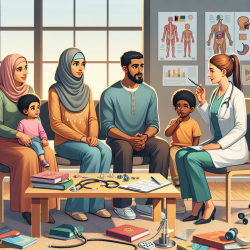Introduction
In the realm of speech-language pathology, especially in the context of children, data-driven decisions are pivotal. The recent study, "Reducing inequities in maternal and child health in rural Guatemala through the CBIO+ Approach of Curamericas: 8. Impact on women’s empowerment," provides a compelling example of how structured approaches can lead to significant empowerment outcomes. This blog explores how practitioners can leverage these insights to enhance their practices and drive better outcomes for children.
The CBIO+ Approach: A Brief Overview
The CBIO+ Approach integrates the Census-Based, Impact-Oriented Approach, the Care Group Approach, and Community Birthing Centers. This comprehensive strategy was implemented in rural Guatemala, focusing on empowering Indigenous Maya women by enhancing their participation in health-related decision-making and community activities.
Key Findings and Implications for Practice
The study demonstrated statistically significant increases in women's active participation in community meetings and health-related decision-making. These outcomes underscore the importance of structured, community-based interventions in fostering empowerment. For practitioners, this highlights the potential of community involvement and data-driven strategies in improving health outcomes.
- Community Engagement: Encourage active participation from community members in health-related activities. This engagement can be a powerful tool for empowerment and improved health outcomes.
- Data-Driven Interventions: Utilize data to identify key areas of need and tailor interventions accordingly. This ensures that resources are allocated efficiently and effectively.
- Empowerment through Education: Providing education and resources to women can significantly enhance their decision-making capabilities, leading to better health outcomes for themselves and their children.
Encouraging Further Research
While the study provides valuable insights, it also opens avenues for further research. Practitioners are encouraged to explore the following areas:
- Longitudinal Studies: Investigate the long-term impacts of empowerment on maternal and child health outcomes.
- Cultural Adaptations: Explore how the CBIO+ Approach can be adapted to different cultural contexts to maximize its effectiveness.
- Technology Integration: Examine the role of technology in enhancing community engagement and data collection.
Conclusion
The CBIO+ Approach in rural Guatemala provides a powerful example of how data-driven, community-based interventions can lead to significant improvements in women's empowerment and health outcomes. For practitioners in speech-language pathology and related fields, these insights offer a blueprint for implementing effective, evidence-based strategies to enhance children's outcomes. By embracing community engagement, data-driven decision-making, and empowerment through education, we can create transformative impacts on children's lives.
To read the original research paper, please follow this link: Reducing inequities in maternal and child health in rural Guatemala through the CBIO+ Approach of Curamericas: 8. Impact on women’s empowerment.










